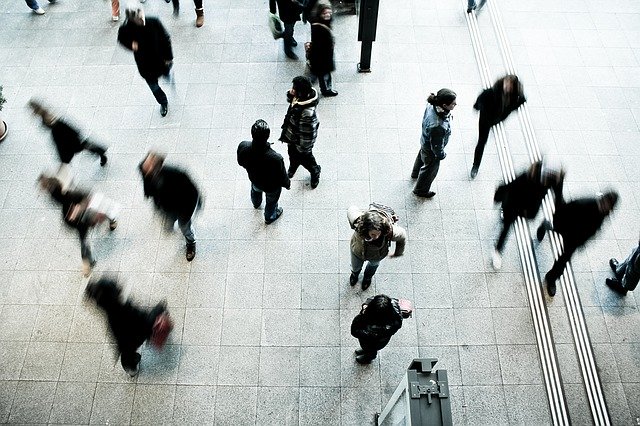- Content
- Opinion
- Low City Footfall, Congestion Charge and the Effect on Security Officers
24 August 2020
As fewer people commute to work in city centres, this will inevitably alter the role of the front of house security officer.
Theo Nicolaou, Managing Director at SmartSec Solutions, discusses how the performance of our cities has a direct impact on local economies throughout the UK. Nicolaou joined SmartSec Solutions, a professional security provider, ten years ago. He has held a number of senior positions throughout his career and has a strong background in customer service delivery roles. He also has an LLB Honours degree in law.
"Security officers themselves need to get used to the new measures of keeping the required distance from people and regularly washing their hands. We are having to be patient and empathetic as some clients understandably do react with some frustration to the new rules."
We Can’t Skirt Around the Issue: London is Desperate and it Must be Addressed
On July 17, the Prime Minister announced that he was abandoning the advice to “work from home where you can” to encourage people back into the office. However, recent data from the Centre for Cities thinktank revealed that just one in six workers have gone back to work in cities this summer. The data also showed that, in the first two weeks of August, footfall in cities was just 17 per cent of pre-lockdown levels.
Whilst many continue to work from home, the knock-on effect this is having on businesses operating within city centres will be catastrophic. Bars, restaurants, coffee shops, beauty salons, and sandwich bars which have relied on the spend of city centre workers have an uncertain future. It’s hard to disagree with London Mayor Sadiq Khan’s "bagel like" recovery analogy. Footfall and expenditure in London suburbs is increasing but central London remains extremely quiet.
Larger Buildings Operating at Approximately 10-15 Per Cent of Maximum Occupancy
We speak from first-hand experience. As a specialist front of house security provider with a strong focus on London, the level of footfall coming through our corporate buildings is frighteningly low with many of our larger buildings operating at approximately 10-15 per cent of maximum occupancy. Employers are reluctant to allow their staff to travel on packed trains, who also remain nervous about commuting to work. We understand and empathise with this.

Picture: Photograph of Theo Nicolaou
None of this is helped by the roll-out of congestion charges in London, which is now 7am to 10pm Monday to Sunday. At the height of lockdown, key workers were able to drive into work and park up at their convenience. This was particularly useful for our night security officers. Now they fall into the congestion charge and as a result are forced to use public transport, which no one wants at this particular time. The government needs a strategy to encourage people back into city centres, both for work and cultural visits. Addressing the congestion charges should be a priority. If all else fails, perhaps the Chancellor should consider replicating a German-style model and extending the furlough scheme to 24 months. Anything to add levels of reassurance and security.
Patience and Empathy Needed
As we emerge from lockdown, cities have also revealed alterations to how their roads and pavements are used. One of our buildings, 6 Bevis Marks, a Grade-A office and retail space in the heart of the City, has introduced many COVID-19 procedure changes.
The management of the building now relies on digital copies only – all paper logs have been removed. Furthermore, no external couriers, delivery drivers, or postmen are allowed in the building. All must now use one of the limited external access points.
This does impact our security officers. It takes more time for all occupiers to understand new limitations in the building and sometimes people don’t necessarily want to obey new rules. Security officers themselves need to get used to the new measures of keeping the required distance from people and regularly washing their hands. We are having to be patient and empathetic as some clients understandably do react with some frustration to the new rules.
"We can’t take London’s role for granted. We need to address this emergency before the economic ripples turn into crashing waves on us all."
Floor and wall signage to aid directions throughout the building is complemented with a one-way system in the main reception. Our staff are using counters to ensure the right occupancy levels and reporting if these are exceeded. They’re directing a two person-per-lift policy which, in high-rises can be a challenge. However, with footfall still so low, this isn’t posing as a significant challenge yet.
The next time to gauge the level of activity within London will be when the kids go back to school.
If things don’t rapidly change, then the future of London should concern us all. The performance of our capital has a direct impact on local economies throughout the UK. The sustainability of its economy is at the point of no return and the pace at which working patterns is moving back towards pre-pandemic levels look some way off. We can’t take London’s role for granted. We need to address this emergency before the economic ripples turn into crashing waves on us all.
Picture: A photograph showing commuters walking across a busy concourse
Article written by Theo Nicolaou | Published 24 August 2020
Share
Related Articles
Front-Of-House Strategies For Dealing With Aggressive Behaviour Post-Lockdown
It’s clear that the role of our front-of-house workforce and security staff is going to change significantly as buildings reopen.
The security guard that greets...
Read Full Article
Male Security Guards Have One Of Highest COVID-19 Death Rates
The Office for National Statistics has today published the latest figures regarding COVID-19 death by occupation, again revealing a high death rate in the security...
Read Full Article
Speech to Text Technology Could Help Communication Whilst Wearing a Face Mask
To help overcome communication issues caused by wearing face masks, Corps Security has begun a pilot scheme which equips security officers with speech to text and...
Read Full Article
Security Officer Appreciation Week – #ThankYourSecurityOfficer
A security services provider is hosting a series of thank-you visits to their colleagues to mark Security Officer Appreciation Week.
Corps Security, a security...
Read Full Article
Research Shows Reasons Behind Security Staff’s Susceptibility to COVID-19
Age, working location, ethnicity, and working in close proximity to others have all been identified as factors that may contribute to security officers having one of the...
Read Full Article
How Is The Security Industry Protecting Its Workforce?
As safety and hygiene measures are ramped up on trains and at stations this week, security guards with crowd management training are being deployed.
Trains have been...
Read Full Article
Memorial to Transport Workers who Lost Their Lives to COVID-19 Unveiled
A new memorial in Aldgate that commemorates transport workers who passed away due to COVID-19 has been officially opened by the Mayor of London Sadiq...
Read Full Article
MPs’ COVID-19 Report Calls on Minimum Standards for Hygiene Infrastructure
MPs are recommending a series of measures to prepare the UK for future public health emergencies, resulting from an inquiry into the role of cleaning during the COVID-19...
Read Full Article
Sodexo’s Head of Health & Safety Named COVID Workplace Champion
April Harvey from Sodexo has been recognised for her role as health, safety and risk lead in the mobilisation of the first COVID quarantine facility and COVID-19 test...
Read Full Article
A Guide to Conflict Resolution for Security Workers
Steve Johnson from workingthedoors.co.uk outlines several de-escalation tactics that are a vital part of security work.
Steve has spoken with many security...
Read Full Article

.gif)

.gif)

.gif)







.png)

.png)
